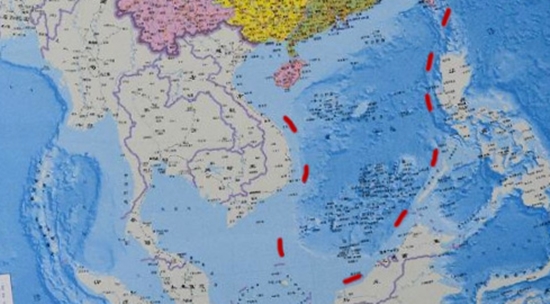
If someone in your town were harassing no fewer than 15 of your neighbors, what would you call that person? Eccentric? Irritable? Crazy? Dangerous?
China asserts territorial claims on at least 15 of its neighbors. That’s not a total of 15 disputed territories, that’s 15 countries various territories of which are claimed by China. The list includes the Philippines, Indonesia, Vietnam, Japan, South Korea, North Korea, Singapore, Brunei, Nepal, Bhutan, Laos, Mongolia, Myanmar.
Check the map
The situation was made worse late last year by the publication of an official Chinese map reaffirming China’s assumption that it owns almost all of the South China Sea, “an area larger than India, stretching from China’s shores thousands of kilometres to the territorial waters of the Philippines, Malaysia, Indonesia, Brunei, Vietnam and Taiwan.”
The Philippine defense secretary, Gilberto Teodoro, says that publication of the new map “absolutely proves [China’s] intent of expanding and being more assertive.”
The Sri Lanka Guardian asks the right question: “China’s Unquenched Territorial Greed—What Is the Limit?” Even CNN felt compelled to say: “China is doubling down on its territorial claims and that’s causing conflict across Asia.”
If there were an ongoing record of amicable resolutions, some of the harm would be offset; if that were the case, given enough time the list of claims could shrink to none. But China has shown no tendency to amicably resolve these disputes.
China’s most recent dispute settlement occurred in 2004, with Russia. Earlier, there were treaties with Vietnam and Tajikistan; and from 1960 to 1996, a handful more. All of this is pre-Xi, of course.
Meanwhile, that troubling new edition of China’s “standard map” even shows what appears to be a renewed claim to Russia’s Bolshoi Ussuriysky Island, whose status was settled in 2004. Russia says it’s not going to reopen the dispute. “The Russian and Chinese sides adhere to the common position that the border issue between our countries has been finally resolved,” says the Russian Foreign Ministry.
Been resolved. The Russians can adhere to the 2004 agreement. But can—or will—the Chinese?
Imbalancing act
Benjamin Jebb has argued that the sheer number of countries that China contends with in these border claims creates its own equilibrium. “China has traditionally been hesitant to resolve land-based territorial crises by force due to fears that its belligerence could provoke unity between its adversaries.” He believes that “since contiguous border disputes and the issue of Taiwan are more likely to push Beijing’s rivals into a balancing coalition than competition over maritime claims, Beijing has normally elected for a more cautious approach to its land-based disagreements.”
Such “balancing” (or imbalancing) coalitions sometimes emerge in history to deal with obnoxious troublemakers (for instance, the League of Cambrai, a sixteenth-century military alliance directed against the Republic of Venice).
Note that “China’s maritime disputes, however, present a different risk calculation,” in Jebb’s view, for “disputes over contested maritime terrain are unlikely to blossom into full blown military conflicts that threaten the CCP’s security directly.”
Commentary at the national security website War on the Rocks sheds light on China’s advantage in maritime disputes. “The Red theory of victory consists of two notions,” suggests Brad Roberts. “First, that decisive military action by the United States to reverse a fait accompli can be prevented by exploiting divisions within and among its allies and the United States itself. And second, that the United States can be persuaded to cede some important regional interest rather than employ its full military potential because its stake is not sufficient to engage in sustained brinkmanship and competitive escalation.”
Periods of resistance
Where maritime claims are concerned, then, China may count on the United States to extract itself from conflicts “on terms that sacrifice the interest it was defending, thereby showing America’s security guarantee to be unreliable.”
But the deterrent of too-great cost of escalation can be a two-way street. China doesn’t always want to keep pushing come hell or high water either, as South Korea recently demonstrated when its coast guard “seized five Chinese vessels for allegedly fishing illegally in the country’s waters late last month, confiscating boats and deporting several crew members.”
Here’s the wow factor: “The country’s coast guard said that, on average, 300 Chinese vessels fish illegally in the country’s exclusive waters each day, with that figure dropping to an estimated 140 during periods of intensified crackdowns.”
Periods of intensified crackdowns.
The point is that South Korea often cracks down on Chinese incursions without suffering any bad diplomatic or military consequences. For China, the stakes are not worth causing more trouble.
On the maritime questions then, one answer to China’s unneighborly and continuous aggression may be for its victims to resort to periods of intensified crackdowns. Call the police on that crazy neighbor.
This could also be worth trying in the land-based disputes to see how much China fears provoking an anti-China league.
The risks of testing China’s will to escalate may not be as great as we think. □
James Roth works for a major defense contractor in Virginia.





